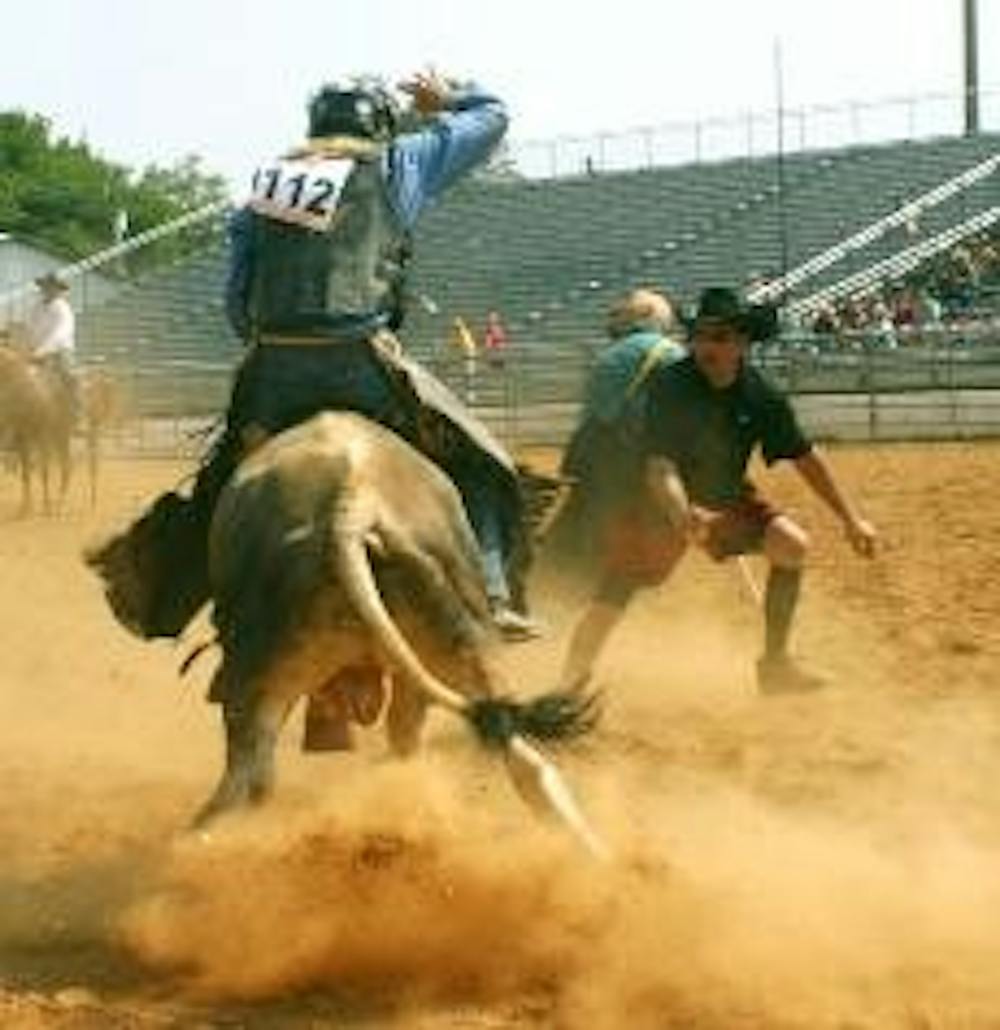A thick dust settles over the arena as partners Keith Huber and Rob Sterner tie a magenta bow on the tail of an incredibly animated steer. The steer twitches severely, jumping up on its hind legs to avoid being pegged with the vibrant strip of cloth. After several noble attempts, the arena clown, whose uniform dons the moniker "Arena Bitch," announces, "That steer does not like that color, and I don't blame him!"
Welcome to the Gay Rodeo.
The Atlantic States Gay Rodeo Association had its 15th annual Atlantic Stampede last Saturday in Gaithersburg, Md. Nick Sakurai, the program coordinator for the Gay, Lesbian, Bisexual, Transgender and Ally Resource Center, traveled with a handful of American University students Saturday morning to attend the event.
The International Gay Rodeo Association is the umbrella organization under which Atlantic Stampede GRA and other regional gay rodeo organizations operate. The current president of IGRA, Brian Helander, made a special appearance at the Atlantic Stampede, wearing a '70s-inspired women's one-piece jumper in the Wild Drag Race.
In the event, three partners goad a steer into crossing a white chalked line, which it sees hovering several feet above where it actually lies. The steer interprets it as a physical barrier, and the partners must scramble to push it over the line. Once this is accomplished, the partner in drag grabs the steer to push it across the line again.
The Wild Drag Race, as well as goat dressing and steer decorating, are events unique to the IGRA. Chute dogging, steer riding, team roping and pole bending are some of the other events that could be found at any rodeo. However, the major difference between the IGRA and other rodeos is the inclusion of women in all of these events.
"The IGRA is all-inclusive," Sterner said. "We respect all people and animals."
Huber and Sterner traveled from Ft. Lauderdale, Fla. to attend the rodeo. A registered nurse by day, Huber has taken the long journey up to Maryland for four years. Like most contestants there, he hopes to accumulate enough points to go to Denver, where the IGRA Finals Rodeo will be held in October.
Still, Huber and all the other cowboys and cowgirls are there for the camaraderie. Huber sees the rodeo as a second family for many - and a growing family, too.
"It's a great way to meet some fine people," he said.
Huber spoke of 24-year-old Darla Horn, a regular contestant at the Stampede. Clad in skinny black jeans, leather gauchos, boots, an enormous "Atlantic Stampede" belt buckle, a mouthpiece and a helmet, Horn seems to mix cowgirl and indie chic. Although she currently resides in Brooklyn, N.Y., she was born in Texas. Her upbringing helped Horn gain a familial sentiment from participating in rodeos. Like her grandfather and uncle before her, she too found pleasure in the raucousness of the ring.
"I feel like I put on a mask in New York, and I take it off here," she said.
Her uncle, Mitch Horn, said she has "cowboyed up" this year. He said "cowboying up" means "doing the right thing, or doing something because you know you should."
GLBTA members who "cowboyed up" to attend the event were pleased with the Stampede. Kevin Ballie, a sophomore in the College of Arts and Sciences and a director of the Rainbow Speakers Bureau, an on-campus GLBTA discussion group, said he thought the turnout from AU was small but felt the rodeo was a wonderful example of a culture within the GLBT community.
"I hoped to see a community event, and it far exceeded my expectations," he said. "I was not surprised by the existence of a gay rodeo, since I've followed the IGRA before."
Ballie said that he feels gay rodeos help shake up stereotypes some people may hold about the GLBT community and the subcultures within it.
"It was fantastic to see an event whose emphasis was not on sex, since much of society would like to base the GLBT community's entire culture on that," he said.





